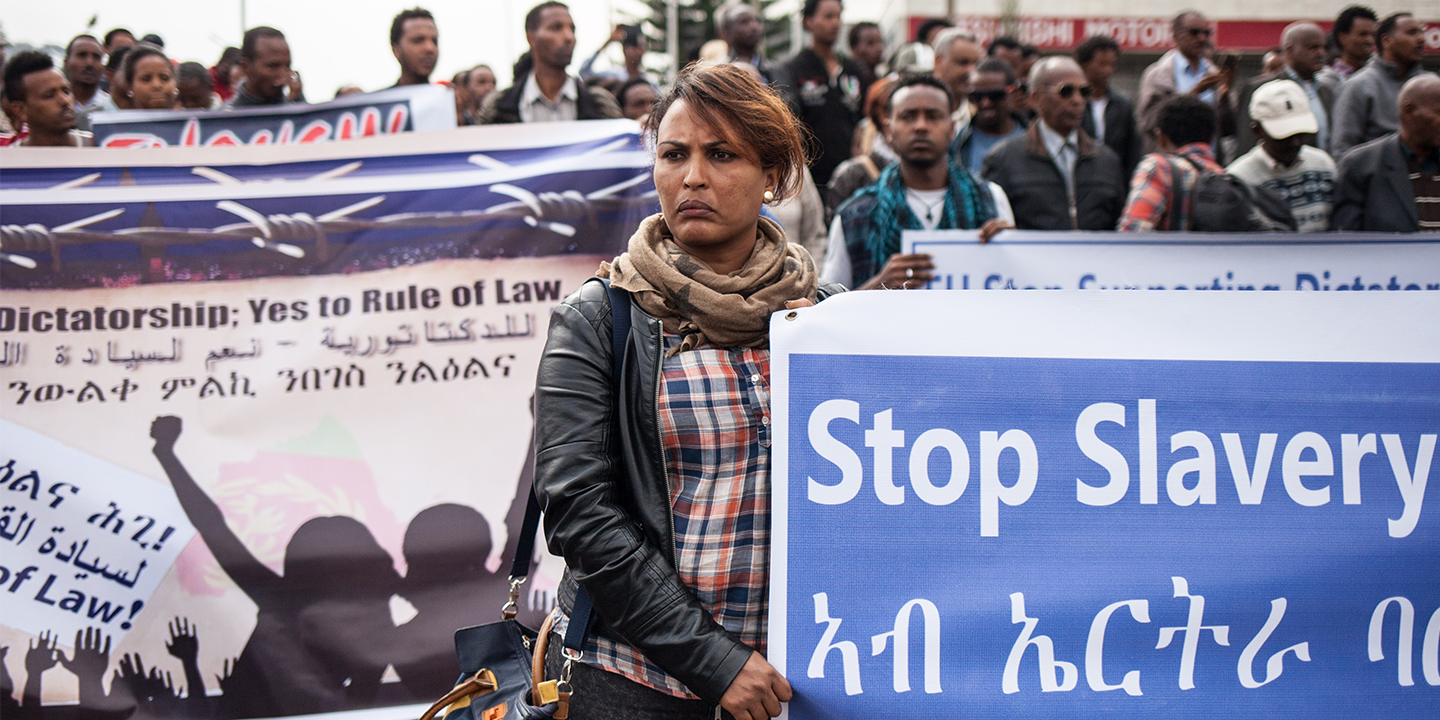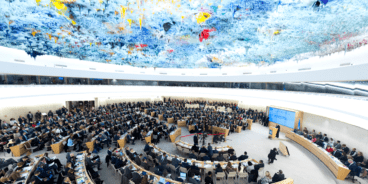

HRC47 on Eritrea: renew vital mandate of UN Special Rapporteur
To Permanent Representatives of Member and Observer States of the United Nations Human Rights Council (Geneva, Switzerland)
Excellencies,
In 2020, the UN Human Rights Council maintained its scrutiny of Eritrea’s human rights situation. Since no progress could be reported in the country, the Council considered that monitoring of and reporting on the situation was still needed.
As Eritrea completes its first term as a Member of the Council (2019-2021), its Government shows no willingness to address the grave human rights violations and abuses UN bodies and mechanisms have highlighted or to engage in a serious dialogue with the international community, including on the basis of the “benchmarks for progress” identified by the Special Rapporteur in 2019. Furthermore, Eritrean forces are credibly accused of being responsible for grave violations in Ethiopia’s Tigray region, some of which may amount to crimes under international law, since the beginning of the conflict in November 2020.
Scrutiny of Eritrea remains vital. At the 47th session of the Council (21 June-15 July 2021), we urge your delegation to support the adoption of a resolution extending the mandate of the Special Rapporteur on the human rights situation in the country for a further year. In addition to ensuring that Eritrea’s domestic situation remains subject to monitoring and public reporting, the resolution should include a request on the High Commissioner for Human Rights to report on the role played and possible violations committed by Eritrean forces in Ethiopia’s Tigray region since November 2020.
While welcoming the adoption of resolutions 41/1 and 44/12 under the Council’s agenda item 2, many non-governmental organisations cautioned that any shifts in the Council’s approach should reflect corresponding changes in the human rights situation on the ground.
Regrettably, the concerns expressed in a joint civil society letter published last year remain valid. Key human rights issues in Eritrea include:
-
-
- Widespread impunity for past and ongoing human rights violations. Arbitrary arrests and incom- municado detention continue unabated, as do violations of the rights to a fair trial, access to justice and due process, enforced disappearances, and lack of information on disappeared persons. For instance, the fate and whereabouts of Ciham Ali Ahmed, an Eritrean-American citizen who in 2012 was thrown into indefinite detention aged 15 for attempting to flee the country because her father, a government official, defected, remain unknown.
- Conscription into the country’s abusive national service system. Secondary school students, some still children, continue to be conscripted in their thousands each year, including amidst the pandemic. Indefinite national service, involving torture, sexual violence against women and girls, and forced labour, continues. Thousands remain in open-ended conscription, despite the 2018 peace accord with Ethiopia.7 Those who joined the national service in 1994 have not been demobilised, and they are still conscripts 27 years later.
- Restrictions on the media and media workers. A free and independent press continues to be absent from the country and 16 journalists remain in detention without trial, many since 2001.
- Severe restrictions on civic space. These restrictions result in Eritrean citizens being largely unable to exercise their rights to freedom of opinion and expression, peaceful assembly, association, and religion or belief.
-
On 24 February 2021, in his first address to the Council, the Special Rapporteur on Eritrea, Dr. Mohamed Abdelsalam Babiker, indicated that he had seen “no concrete evidence of progress or actual improvement in the human rights situation in the country.” He added that “Eritrea has not yet put in place an institutional and legal framework to uphold minimum human rights standards in a democratic society. The country lacks rule of law, a constitution and an independent judiciary to enforce the protection of and respect for human rights […].”
On 26 October 2020, his predecessor, Ms. Daniela Kravetz, highlighted that two years after the peace agreement with Ethiopia and the lifting of UN sanctions, she could only note that severe restrictions on civil liberties remained in place and lament a “lack of meaningful and substantive improvement” in relation to the benchmarks for progress she identified.
On 26 February 2021, High Commissioner Michele Bachelet stressed that she “remained concerned by the lack of tangible progress” in the country and was “disturbed by reported abductions and forcible returns of Eritrean refugees living in Tigray – some reportedly at the hands of Eritrean forces.”
Since November 2020, these and other independent experts and UN actors have expressed deep concern over the involvement of Eritrean forces in the conflict affecting Ethiopia’s Tigray region. The violations reported include violations of Eritrean refugees’ rights, including possible killings,13 abductions, and forced return to Eritrea, as well as atrocity crimes against civilians.
In early 2021, Amnesty International reported that on 28-29 November 2020, Eritrean troops fighting in Tigray systematically killed hundreds of unarmed civilians in the city of Axum, opening fire in the streets and conducting house-to-house raids in a massacre that may amount to a crime against humanity.14 Human Rights Watch also reported on how Eritrean and Ethiopian forces indiscriminately shelled Axum, killing and wounding civilians, shot civilians, and pillaged and destroyed property, before the Eritrean forces fatally shot and summarily executed several hundred residents, mostly men and boys, over a 24- hour period.
UN actors, including the Secretary-General, Mr. António Guterres, and the Head of the Office for the Coordination of Humanitarian Affairs (OCHA), Mr. Mark Lowcock, called on Eritrean troops to leave Tigray. Mr. Lowcock added that “countless well-corroborated reports suggest [Eritrean forces’] culpability for atrocities.” The High Commissioner for Refugees, Mr. Filippo Grandi, also publicly expressed concern about the safety of Eritrean refugees in Tigray, considering in particular the infiltration of armed actors in refugee camps.
In 2018, the Council invited the Special Rapporteur to “assess and report on the situation of human rights and the engagement and cooperation of the Government of Eritrea with the Human Rights Council and its mechanisms, as well as with the Office of the High Commissioner [OHCHR], and, where feasible, to develop benchmarks for progress in improving the situation of human rights and a time-bound plan of action for their implementation.”
As a Council member, Eritrea has an obligation to “uphold the highest standards in the promotion and protection of human rights” and to “fully cooperate with the Council.” However, the Eritrean Government refuses to cooperate with the Special Rapporteur, and continues to reject findings of ongoing grave violations and calls for reform.
The Council should ensure adequate follow-up by allowing the Special Rapporteur to pursue his work and OHCHR to deepen its engagement with the Eritrean Government. It should also urge Eritrea to meet its membership obligations before the end of its term (31 December 2021) and to engage with the UN human rights system constructively. At the recent 46th session, Eritrea announced its intention to again seek Council membership for a further three-year term. The Council should not reward non-cooperation, but rather maintain scrutiny of Eritrea and hold it to its membership obligations to engage in good faith with Council-appointed mechanisms and take concrete, measurable steps to address the grave human rights concerns repeatedly identified by successive Special Rapporteurs and the High Commissioner herself.
At its upcoming 47th session, the Council should adopt a resolution:
(a) Extending the mandate of the Special Rapporteur on Eritrea for one year;
(b) Urging Eritrea to cooperate fully with the Special Rapporteur by granting him access to the country, in accordance with its obligations as a Council Member;
(c) Calling on Eritrea to develop an implementation plan to meet the benchmarks for progress, in consultation with the Special Rapporteur and OHCHR;
(d) Requesting the High Commissioner to present an oral update on the human rights situation in Eritrea at the Council’s 49th session;
(e) Requesting the Special Rapporteur to present an oral update at the Council’s 49th session in an interactive dialogue, and to present a report on the implementation of the mandate at the Council’s 50th session and to the General Assembly at its 77th session; and
(f) Requesting the High Commissioner to present an oral report on the role played and possible violations committed by Eritrean forces in Ethiopia’s Tigray region since November 2020, at the Council’s 48th session.
We thank you for your attention to these pressing issues and stand ready to provide your delegation with further information as needed.
Sincerely,
1. Africa Monitors
2. African Centre for Democracy and Human Rights Studies
3. AfricanDefenders (Pan-African Human Rights Defenders Network)
4. Amnesty International
5. Article 19 Eastern Africa
6. Botswana Watch Organization
7. Cairo Institute for Human Rights Studies
8. Center for Civil Liberties (Ukraine)
9. Center for Reproductive Rights
10. Centre for Constitutional Governance (Uganda)
11. CIVICUS
12. Civil Rights Defenders
13. CSW (Christian Solidarity Worldwide)
14. DefendDefenders (East and Horn of Africa Human Rights Defenders Project)
15. Egyptian Initiative for Personal Rights
16. ERISAT
17. Eritrea Focus
18. Eritrean Law Society (ELS)
19. Eritrean Movement for Democracy and Human Rights (EMDHR)
20. Ethiopian Human Rights Center
21. Freedom House
22. Genève pour les Droits de l’Homme / Geneva for Human Rights
23. Global Centre for the Responsibility to Protect
24. Human Rights Concern – Eritrea (HRCE)
25. Human Rights Watch
26. International Commission of Jurists
27. International Federation for Human Rights (FIDH)
28. International Movement Against All Forms of Discrimination and Racism (IMADR)
29. International Service for Human Rights
30. Odhikar (Bangladesh)
31. One Day Seyoum
32. Robert F. Kennedy Human Rights
33. Southern Africa Human Rights Defenders Network (SAHRDN)
34. West African Human Rights Defenders Network / Réseau Ouest Africain des Défenseurs des Droits Humains (ROADDH/WAHRDN)
35. World Organisation Against Torture (OMCT)
Related Content


